- Home
- Jana Petken
The Guardian of Secrets and Her Deathly Pact Page 51
The Guardian of Secrets and Her Deathly Pact Read online
Page 51
Pedro sensed the fear of men who had not witnessed a battle before, and as he gathered his own unit around him, he tried to give them the hope and courage that he had never had during his early days in Africa.
“Sometimes,” he told his men, “the fear of battle is what stops us from embracing the victory to come. Is it not better to fight and be in the thick of things than to wait in the wings and wonder how it’s going to turn out? I say let’s get cracking and kick their fascist arses! I say it’s better to die a hero than to live under Nazi and fascist rule. The Russians are with us, with their tanks and arms. The British communists and socialists are here with a determination to win at any cost. German, Polish, and Italian brothers-in-arms are with us, and they will not bend, hide, or crouch behind a rock but will fight face-to-face with their oppressors until they have no more breath in them. I’m talking about you. All of you here! So how can we fail, brothers? Win or lose, we will, from now on, live on our feet and not on our knees. We might die tomorrow, but if we do, it will be as free men on our own terms, not as men in exile or in prison but as equals. No better and no worse than our enemy! Are you ready to fight? Are you ready?”
Pedro looked around him at the faces shouting the words “We are ready!”
The shouts and cries pierced the noise of the distant guns until only chanting and singing could be heard in the night sky. Pedro sat on the ground and clutched his rifle to his chest. He swallowed hard and prayed silently. He had never felt so scared.
Chapter 61
Joseph Dobbs, who had been trying to sleep under a supply truck, sat up and cursed the commotion all around him. He had been drinking heavily all night. The barrels of brandy in the truck that he looked after, which were, according to the power-hungry officers, to be used only for medicinal purposes, had been a godsend. Medicinal purposes, my arse, he growled in anger when he couldn’t get his boots back on. His medicinal purpose was more important than anaesthetising some stupid git on the battlefield! He rolled on his belly from under the old relic and eventually pulled on his boots. He’d have a word with whoever was shouting, raving, and ruining the only bloody rest he’d had all day!
Joseph crossed the small distance between him and the group of men now sitting around a small campfire. He watched them from the shadows for a moment before advancing any further. The mood around the fire was one that he could only describe as annoyingly sentimental and gushy. They’re a load of bloody silly women, he thought, disgusted by what he saw. Softly sung songs hanging in the air, arms intertwined, and speeches of glory had left them actually looking forward to the fight that would probably see most of them dead by afternoon.
“Do you need to make this bloody racket?” Joseph shouted at the edge of the group. “Some of us want to get some sleep. We’re not in a fucking fairground, you know!”
Pedro turned around to face the angry voice that stood behind him.“Do you want coffee? Spanish coffee will keep you awake for days if that’s your problem.”
The others laughed with Pedro, and then Hans said, “Come on, sit with us. We’re going to kill fascists tomorrow. This is no time to sleep.” Hans made room for Joseph on the ground beside him.
Joseph sat down between Pedro and Hans and accepted a cup of coffee. He said no more for the moment but instead meticulously studied Pedro’s face with a growing sense of knowingness. He was familiar to him, he thought. His gestures, every turn of his head, every passionate expression that crossed his eyes left Joseph with a nagging sensation. This meeting had been fated. Coming across each other was important for some reason. Who he was he’d not ascertained yet, but he was English, a southerner by his accent. He stood out from the others, from the men he’d come to this godforsaken land with. He had travelled through Spain all the way to Albacete and Madrid, missing his chance in Valencia to get off the violent merry-go-round of a war that didn’t concern him. He had taken a gamble and had gone with his gut feeling in the hopes of finding four people, and now he was glad he did.
He continued to watch Pedro’s good-humoured banter, unable to peel his eyes away from him. No one, English or otherwise, had made him stand up and take notice like the young man who’d just given him the coffee. He shuddered as though someone had just walked over his grave. He looked at Pedro again and froze. Looking at him was like looking in a fucking mirror! The man was just a younger version of himself. The cords on his neck and hair on his arms stood rigid.
“Did you make that speech?” he asked Pedro, hiding his growing excitement.
“Yes. Why? You didn’t like that either?” Pedro asked, good humour sparkling in his eyes.
“No. I mean, yes. It was good … Name’s Harry Miller. Yours?”
“Peter, Peter Merrill,” Pedro said, shaking Joseph’s hand.
Joseph hid behind his poker face, not quite believing this turn of fate. He was at a loss about what to do or say next. On the outside, he was sure that he looked perfectly normal, but his head was pounding with questions, plans, and revenge, all fighting to get out of there and into his mouth. His stomach was churning, and he needed a drink to settle it. Remember, Joseph, he told himself, you’re not a good poker player; you’re a great poker player. Keep yourself steady and don’t give anything away. Fuck, he was sitting next to his own son!
Adrenaline coursed through his body. He attempted to hide the tremor in his voice but ended up speaking in an accelerated shrill-like fashion. “So where are you from, Peter?” he asked him without blinking an eye.
“Goudhurst, Kent.”
“Ah, Kent. I went there once, a few years ago, mind you.”
Pedro nodded. “By your accent, I’d say you’re a northerner. So what are you doing here? You’re a bit old to be fighting, aren’t you?” he asked him.
Joseph hid his annoyance. The boy was a snob, just like his mother.
“I’ve seen a lot older than me here,” he told him. “Anyway, I’m not fighting, not on the front lines. The leg won’t let me hold a rifle and run at the same time, so I’m just making myself useful: cooking, cleaning boots for the officers, washing up after them, loading the trucks, unloading the trucks … a bit of everything. Anything to help.”
“Good, that’s good. We need people like you. Everyone is useful around here.” Pedro slapped him on the back.
“So what does your mother think about you fighting over here? I bet she wasn’t happy about it. Back in England, is she?”
“Yes, she is, and no, she’s not happy, but then, I don’t think anyone’s mother is happy when her son goes to war. What about your family? Married?”
“I was once. Let’s just say it didn’t work out.”
Pedro yawned. “Sorry about that,” he said, standing up. “It was good to meet you, Harry Miller, but if you don’t mind, I think I’ll get some kip. Hans might want to sing all night, but I’m going to shut my eyes for a while. Going to need them tomorrow. I suggest you do the same.”
Joseph watched Pedro leave the group, devouring him with his eyes. He had an easy smile. He seemed popular with the other men. He held himself well, with a confident swagger of the hips and sure-footed stride. He was good-looking too. In fact, he was just like him in every way.
He walked back to his bed underneath the truck, grinning from ear to ear. He’d been unsure about getting off in Valencia when his target was right here in front of his nose, probably had been since that Albacete hole he’d spent weeks in. He hadn’t felt this satisfied since the day they buried old Peter Merrill. But what to do now was the question. He couldn’t very well get his gun out and shoot him in front of all these people. Peter seemed to be well known. But how come Peter got to sleep in a tent when all he had was a rough woollen blanket on the ground underneath a stinking truck? He was twice his age too. As he walked, he passed a couple of Englishmen playing cards; he’d give poker a miss tonight, he decided. He had too much to think about. Peter Merrill was more important to him now than anything else, and the sooner he dealt with him, the sooner he’d get ou
t of this filthy city and on to one of Celia’s other brats. He wouldn’t have another drink tonight; he needed his wits about him. There was so much to think about and not much time to execute whatever plan he came up with.
Chapter 62
Franco’s army stood poised and ready at the gates of the city. Madrid was the ultimate prize and one that would virtually end the war after only six months. However, the arrival of the rebel forces had been delayed by Franco’s decision to liberate the alcázar in Toledo, which had been bravely occupied by rebels, and this proved to be vital for the republicans and costly for the rebel nationalists’ plans. They had been busy organising food convoys and medical teams to feed and treat civilians for when they gained control; however, three days after the government’s departure, they had to be content with a position close, but not close enough, to the centre. The rebel army, now known as the nationalist army, backed by arms and aircraft far superior to anything that the republicans had, waited impatiently for their bloodbath to begin. The Moors, whose reputation preceded them, were a terrifying force and one that the ordinary civilians of the city feared the most. With the Phalanx, their task was to mop up and shoot the surviving important republican figures, like vultures waiting to pick the bones of the dead and dying.
In the city, republican Militia units fell back exhausted and demoralised. Some fled openly, seizing any means of transport to get away from the Moors, whilst others did fight back, and this helped to slow the nationalist advance considerably.
On the nationalist front lines were the overseas units of German and Italian forces. Unlike the republican volunteers, they were mostly disciplined and trained professional soldiers who had been offered executive pay for their services to the nationalist cause. However, there were also some genuine volunteers waiting for their first taste of battle, and they included a few Englishmen and a unit consisting of the several hundred blue shirts of the Irish Battalion under General Eoin O’Duffy. His Catholic volunteers were inflamed with the desire to fight in Spain because of the terrible and gory press releases about the republican atrocities committed against the Catholic clergy in republican zones.
In the south-western suburbs of Madrid, Miguel stood guard, waiting impatiently to be relieved so that he could get some sleep. He was sick to death of the incessant praying and chanting of the Irish and felt as though every bone in his body had been broken and every blister on his feet had burst, making his socks stick to his torn skin. He’d been in hell since his arrival only two days earlier and was now wondering whether his decision to fight with the Phalanx units at the front had been the right one. Before leaving Valladolid, he’d had another fight with Mónica, who made it clear that she would not suffer any more embarrassment at his hands. She’d also told him that his reputation as a softie, as she called him, was ruining her own reputation.
“I think it’s time for a break. You should go to Madrid and fight. Maybe you’ll find the courage you used to have, because you certainly don’t have it now! You’re no use to us here,” she had added without any emotion in her voice.
Well, here he was. He’d done as she asked, although there was nothing wrong with his courage as far as he could tell. On his first day, he’d been ordered to carry out probing attacks from the west along with fifty or so Phalanx and a battalion of Moors. Miguel had been optimistic at the significant advances that they were making, but at the end of four days, exhausted and in need of medical attention for a head injury, he had retreated back to his lines just outside the royal hunting grounds to await new orders.
As he lay in the medical tent, he felt vulnerable, scared, and alone. He was now in one of the biggest fights of his life and had no emotional support from any quarter. He also believed that nobody would really care if he lived or died, for his attempts to contact his family had been stalled by Mónica. She had said that writing to a zone that was not only republican but which also housed the enemy headquarters would be foolish and irresponsible. He had bowed to her wishes, as always, but his family were never far from his thoughts nowadays. They were his kin, and he needed them to know what he was doing and, more importantly, needed news of them.
Miguel left the medical tent for the front lines in the early hours of the morning, slightly more refreshed and with a lot more clarity. As he fought, at times in hand-to-hand combat, he thought about Pedro and wondered where he was. Was he too was somewhere in Madrid with Franco’s African Army? He was struck by the thought that his desire to see his brother was overshadowed by a fear of what the circumstances would be if he did, and for the rest of the day, he neither looked nor listened to dying screams.
Miguel entered the working-class suburb of Carabanchel. The republican militias, fighting on their own territory, not only held them back but inflicted heavy casualties. For three days and nights, Miguel killed and maimed and watched his comrades die. The Moors covered the ground like snakes, refusing to give back what they had taken, and they finally made some progress in their attempt to thrust through to the Valencia road. Miguel saw the sign for Valencia just as he turned the corner leading up to the hill of Cerro de Los Ángeles. Valencia called to him as it never had before. He would get back there somehow, and at some point in this campaign, he would see his family and tell them that he loved them.
Chapter 63
This was like no battle Pedro had ever been in. It was nothing like Seville or Tetuán, where they’d had some respite, sleep, and food in between combat. This was never ending, he thought, dead on his feet. He would have to fight until he dropped or was dying, and they would be forced to carry him back to the medical station. He covered his face with his hands and pushed his fingers through his hair. He remembered and saw, with absolute clarity, the dead bodies he had fallen over earlier, men with their bellies and throats cut with knives and swords. Voices were screaming and praying amid the colour of bright red blood flowing freely like river arteries.
As he heard the order to attack, he rose to his feet again and tried to clear his mind of the gruesome images, but there were so many voices shouting and screaming in different languages that he couldn’t distinguish a word or a proper order. There was a Russian voice in his ear, then German, then Italian, all shouting at each other, forgetting any English, which was agreed would be the common command language for them all. Men were going at it alone, and from his position at the centre, he could see that nobody knew what they were supposed to do or even where they were supposed to be. My God, he was thinking, it was a shambles!
The shambles in Pedro’s mind turned out to be a chaotic and reckless defeat for the republicans at the hands of the nationalists. He, along with other survivors, retreated at dawn just as Miguel forged forward with his unit, looking for live republicans to kill.
Chapter 64
María, Lucia, and Carlos entered the city of Madrid at dawn. Carlos had repeatedly forbidden María to come, but eventually he had agreed, with the condition that he accompany the two women to the hospital in Madrid.
The journey through Valencia, the suburbs, and inland to Madrid had been long but uneventful. They had stayed north of the nationalist lines, which had added some hours to the journey but had also ensured a safer passage. On reaching Madrid, they had been forced to drive through battle-scarred areas strewn with dead bodies and fleeing refugees. It was a miracle, both women had stated, that they had even made it into the republican zone and to the designated station after a stray bullet shattered the truck’s back window and barely missed Lucia’s head.
The two women were to be based in Madrid’s general hospital but had been designated as front-line nurses and would therefore spend a great deal of time going backwards and forwards to help treat the wounded that were unable to get to the main medical facility. María’s first impression of the battle zone had been muted by her shock at seeing the number of dead bodies lying unburied and looted of all dignity. Houses and public buildings still smouldered after they’d been destroyed, and survivors walked aimlessly around the street
s with barrows laden with their worldly possessions.
Half a kilometre from the hospital, they came to a complete standstill in a traffic jam, unlike anything she’d ever seen. The walking wounded, some with crude bandages around their heads, arms, and legs, staggered like drunken men, slowly winding their way in and out of the gridlock of medical aid trucks carrying supplies. Ambulances bulging at the seams with the wounded and medical staff, whose mission it was to keep their patients alive until they reached the hospital, did not seem to be able to find a clear path to their destination. With this in mind, Carlos dropped them off at that point, telling them that he could go no further.
María looked into his eyes and kissed him with a fiery passion that would comfort her in the weeks to come. They kissed in the grey light, oblivious to their surroundings. It was bitterly cold, and their misty breath hovered in the air, disappearing into a sky lit up sporadically by silver streaks of ongoing artillery fire and mortar shells. As she pulled away from Carlos, María determined that there would be no blue skies today. Only dark funnels of smoke would be visible, so much smoke and its foggy aftermath that the sun would not be able to show itself. She held Carlos one last time and prayed that he would not be punished for allowing her to come to this place of death. She could tell by the painful expression on his face that he now regretted the decision to bring her, and when they kissed again, she felt an overwhelming desire to run with him, run as fast and for as long as they could out of the madness to a place where their love could blossom uninterrupted and in peace.
Carlos cupped her face in his hands. “I have to go, but I know where to find you. I’ll be back soon, I promise you. One day you’ll look up and I’ll be there. So look after yourself until then. Keep safe and don’t try to be a heroine, promise me. And promise that you’ll not leave Madrid. I have to know where you are. I have to dream that I’ll find you here and kiss you and love you. My love for you is more important than any of this, and all the bullets, mortar fire, and tanks won’t kill it.”

 Blood Moon
Blood Moon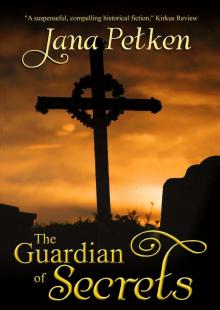 The Guardian of Secrets and Her Deathly Pact
The Guardian of Secrets and Her Deathly Pact Dark Shadows
Dark Shadows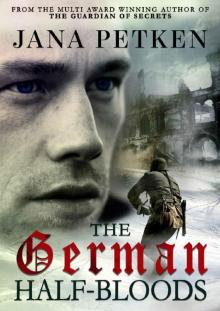 The German Half-Bloods (The Half-Bloods Trilogy Book 1)
The German Half-Bloods (The Half-Bloods Trilogy Book 1)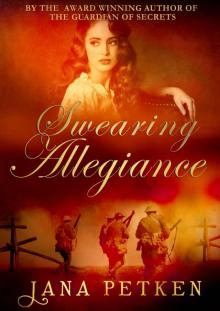 Swearing Allegiance (The Carmody Saga Book 1)
Swearing Allegiance (The Carmody Saga Book 1)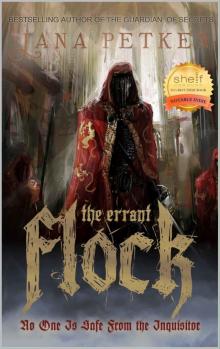 The Errant Flock
The Errant Flock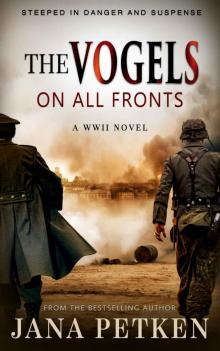 The Vogels: On All Fronts (The Half-Bloods Trilogy Book 2)
The Vogels: On All Fronts (The Half-Bloods Trilogy Book 2)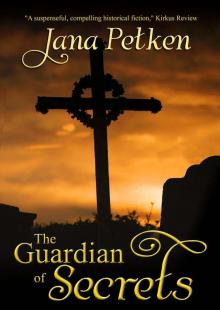 The Guardian of Secrets
The Guardian of Secrets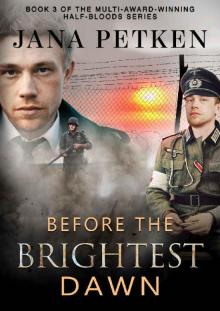 Before The Brightest Dawn (The Half-Bloods Trilogy Book 3)
Before The Brightest Dawn (The Half-Bloods Trilogy Book 3) Blood Moon (The Mercy Carver Series Book 2)
Blood Moon (The Mercy Carver Series Book 2) Dark Shadows (The Mercy Carver Series Book 1)
Dark Shadows (The Mercy Carver Series Book 1)